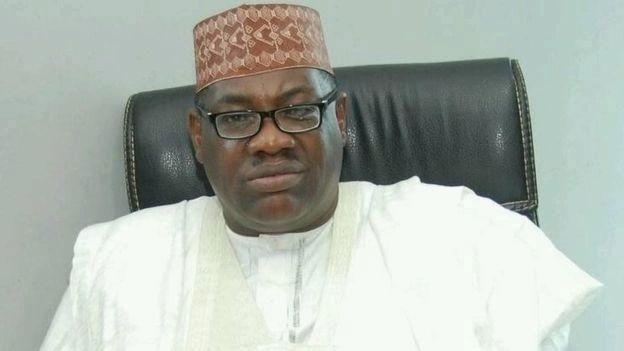
Nearly everything is fair game in politics, but the latest attempt by some elements to see if there is an ethnic fault line that they can exploit between the two major Northern groups, Hausa/Fulani and Kanuri, is a walk on thin ice. The schemers are bound to sink below the thin glacier.
The mischievous headline in some social media “stories” alleging that APC vice presidential candidate Kashim Shettima said some Northerners do not like him because he is ethnic Kanuri was concocted to try to erect a wedge where none exists. There was no way such an experienced politician, administrator, banker, academic and scientist will say such a thing when there is not the slightest hint on the ground that this is the case. In fact, videos of Kashim Shettima’s visits to the Sultan’s and Emir’s palaces all over the Northwest region show that he received the warmest welcome with the deepest respect, at least partly because of his Kanuri heritage.
A video recording of the event at the Emir of Daura’s palace on Wednesday, where Shettima spoke in Hausa, disproves the claim that he said those things. He did mimic some political opponents who say that Kanuri control only two states in the North. His main speech however emphasized the thorough ethnic mix, shared history and cultural traditions as well as the unity of purpose between the Northern ethnic groups.

Since July last year when APC presidential candidate Asiwaju Bola Tinubu chose Shettima as his running mate, some people had cast far and wide to see if there is a fault line that they can exploit to throw a spanner in the APC ticket’s works. While some people were busy assailing the “Muslim/Muslim” ticket, a senior journalist in Lagos alleged that Hausa/Fulani elements were not happy because Tinubu chose a Kanuri man as his running mate. I asked him if he heard anyone from Kano, Katsina, Sokoto, Kebbi, Zamfara, Kaduna, Niger, Bauchi, Gombe, Nasarawa or Adamawa protest the choice. That is because, while such ethnic differences could be played up by desperate elements in governorship and other local political contests, there is complete cultural and political unity of purpose among far Northerners in national politics.
Not just Hausa, Fulani and Kanuri, which are the biggest groups. You can add the Nupe and a hundred other Northern ethnic groups in this united view of national politics. For example, during the NRC presidential race of the Third Republic, Malam Adamu Ciroma, who was from the tiny Bolewa ethnic group of Yobe, was regarded as the leading “Northern” politician. His top rival in the contest, Marafan Sokoto Alhaji Umaru Shinkafi, also touted his minority Yobe ancestry, yet both were seen as the “Northern” lead politicians.
Thirty short years ago, the Abiola/Kingibe ticket recorded resounding political success in Hausa/Fulani heartland, including a big win in its heart of hearts, Kano. Ambassador Babagana Kingibe, like Kashim Shettima, is ethnic Kanuri while Asiwaju Tinubu, like M.K.O. Abiola, is ethnic Yoruba. No one in the North protested Kingibe’s appearance on the ticket then; no one is protesting Shettima’s place on the APC ticket now, certainly not on ethnic grounds. Up until 2019, Shettima was in fact Chairman of the Northern States Governors Forum, and he did a swell job of it.
The man who first alleged this schism obviously does not know that, for centuries, the Hausa/Fulani actually looked “East” i.e. to the Kanuri, for religious leadership. This is obviously because the Kanuri were Islamised centuries before the Hausa. It was only the coming of Sheikh Usman Danfodio that enabled Hausaland to play Islamic catch-up with Borno. Thousands of children are still sent “East” to learn the Qur’an. Before planes arrived on the scene, Kanuri land was also the Hausa’s gateway to the Hajj. When passengers in a commercial vehicle stopped to pray at a roadside mosque, Hausa men easily looked up to a Kanuri passenger, with the native red shawl around his shoulders, and said “Alanguro, please lead us in prayer.” In recent years Boko Haram has somewhat tainted this image, but the “Easterner” is still a thing of respect in Hausaland.
Right now, the most popular governor for Northern youths on the social media is Borno’s Babagana Zulum. They may laugh at his Kanuri-accented Hausa, which sometimes mixes up genders, but it did not stop his quick march to folk hero status among Northern youths within three years.
In national politics, the outlook of all far Northern and many north central ethnic groups is the same. In times of ethnic crises in the Southern states, every Northerner is a Hausa man. Whoever stopped to differentiate between a Kanuri, Hausa or Nupe man in times of crises? Look, during the April 1990 abortive coup when Major Gideon Orkar excised some states from Nigeria, he drew an unbroken red line on the map right from Lake Chad all the way to Sokoto and everything in between. If Orkar had succeeded, lo and behold, we could have made Birnin N’gazargamu the capital of our Sahelian state by now.



